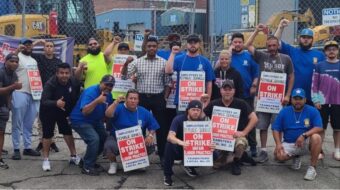
WASHINGTON—Joblessness dropped to 3.7% last month. Inflation hit that figure, too, at an annual rate. Even low-wage workers’ pay hikes surpassed that. So why is everybody so grumpy, pissed off, or worse—and blaming Joe Biden?
Well, the big reason is the numbers they see coming out of Washington don’t match what they see on their grocery shelves, and the prices, even though inflation has cooled, will remain at their new high levels. Capitalists are not in the business of rolling back prices when they don’t have to – which is almost never.
And a big reason for public anger is the continuing obvious greed of the corporate class, a factor the Bureau of Labor Statistics, which compiles the numbers, and Biden, can’t control.
Or as former Labor Secretary Robert Reich put it recently: “Republicans want to blame inflation on Biden. Do you know what they never want to talk about? The deeper structural driver of inflation: The concentration of the American economy in the hands of a few corporate giants with the power to raise prices.”
Which leads to another reason for the gap between all the so-called good news and public anger. The economic numbers have an effect on workers not seen right away in a cursory analysis and they don’t show the “silent” effects on workers of corporate greed.
The BLS market basket is skewed.
Don’t get us wrong. BLS accurately measures and “weighs” 80,000 items for its monthly Consumer Price Index survey. The catch is all its summaries omit food and energy. It calls them “volatile.”
Huh? People have to eat. They have to pay electric bills. They have to fill their vehicles’ gas tanks.
And corporate concentration of unregulated economic power, as Reich said, determines how much they pay to do so.
Who sets the price of grain that goes into your loaf of bread? Agribusiness giants Cargill and Archer-Daniels-Midland. The price of chicken? Tyson Foods. Supermarket prices? Supermarket chains.
No wonder the United Food and Commercial Workers strongly opposed the Kroger-Albertson‘s merger as creating local monopolies nationwide.
The flip side is that while rent and new mortgage rates, now rising at more than 7% annually, are in the basket, so are home purchases and buying cars. How often do you buy either?
The wage perception problem
It’s an axiom of modern politics that the inventors of “catchy” simplistic phrases not only own them but their definition. And Republicans have been better at it than anyone else.
Which is what happened with “Bidenomics.” With joblessness at 5% last year and inflation almost double that, they grabbed it and ran with it, lodging that description in the public mind.
Since the turnaround, including in unemployment—there were 6.291 million jobless in November, down from 6.506 million in October—Biden has co-opted the word. But he hasn’t co-opted the definition in people’s minds.
The comeback–Trumpenomics
So let’s turn the tables on former Republican Oval Office occupant Donald Trump, now the leading contender for his party’s nomination next year. It shouldn’t be too hard.
The ammunition is the coronavirus pandemic, and his rejection and later reaction to it.
Remember the shuttered stores? The closed schools? The disappearance of almost an entire industry—child care? The 24 million workers, some of them previously ineligible for jobless aid, who received federal checks to keep themselves alive?
The 14.7% “official” peak jobless rate? 8.1% inflation? The scramble for syringes, vaccines, and anything else to slow or halt the modern-day plague.
What was Trump’s reaction? First, denial, then wondering whether cleaning solutions (like bleach, for example) could be used to kill the virus inside people, among other fake remedies.
Do we really want to go back to that?
Or do we want an economy where 340,000 Teamsters made big gains at UPS? Where auto industry employment increased by 30,000 last month as United Auto Workers won their strike against the Detroit 3?
Where jobs jumped in the performing arts as SAG-AFTRA and the Writers Guilds won their strikes and preserved their jobs against the ruthless moguls of the TV networks, movie studios, and streaming videos who schemed to use artificial intelligence to turn artists into “zombies?” Their return to work was in the BLS numbers, too.
OK, U.S., take your pick.
Any opinions put forward in this article are the opinions of the author.
We hope you appreciated this article. At People’s World, we believe news and information should be free and accessible to all, but we need your help. Our journalism is free of corporate influence and paywalls because we are totally reader-supported. Only you, our readers and supporters, make this possible. If you enjoy reading People’s World and the stories we bring you, please support our work by donating or becoming a monthly sustainer today. Thank you!










